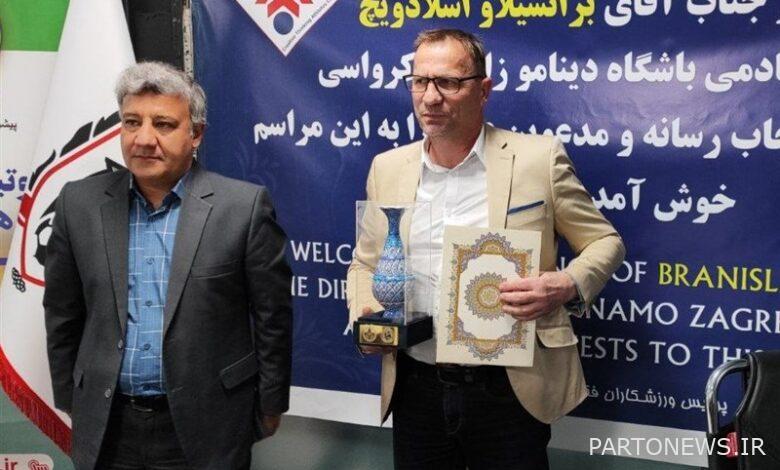
According to the sports reporter of Tasnim news agency, Bransilav Sladovich, the academy manager of Dinamo Zagreb club and UEFA instructor, held a press conference under the pretext of finding talent and creating a suitable structure in Iran’s grassroots football, with the presence of Amin Elami, the vice president of Shahin Ariapars club, the representative of the Bosnian embassy in Iran, Mohammad Hosseini, the CEO of Ariapars club, and Daud. Ramezani, the CEO of the sportsmen’s campus, had a creative idea.
Mohammad Hosseini, CEO of Ariapars Club, said: First of all, I offer my condolences for the terrorist incident in Kerman. Two years ago, we started our work for basic men’s and women’s football in Pars Club. With the cooperation of Tika Academy for women’s basic football, we participated in the second and first leagues of the country and won the license to participate in the premier league. Then, in cooperation with Ariapars club, we decided to do a big thing. We came to the conclusion that the lack of a proper structure is the biggest problem of our grassroots football, and that’s why we asked for help from the Dinamo Ghareb club to create a proper structure.
He added: Branko (Sladovic) was in Iran about eight years ago and was working with Raga club. He left a great impact in his short time. He created a talent search team in Tehran and won the championship in the Croatian competition. One of the products of his work was Amir Hossein Gamar, a member of the national youth team. We hope that with the cooperation of Dinamo club we can create a suitable structure and a lasting work. God willing, we will sign the contract this week so that he will appear in Iran next year and work as an academy manager and coach in our basic teams.
Branislav Sladovic, nicknamed Branko, said about Iranian grassroots football: More than six years ago, we worked with the Raga club together with some colleagues from Croatia. After four months, we sent this club to Croatia and this Iranian team became the champion. Mani Rahimi became the best player and scorer of this tournament (Dynamo Cup).
“According to the experience I gained from my one year stay in Iran, the clubs’ work is not systematic.” Dinamo lives with its football academy. It has introduced players like Modric and Kovacic. We have 60 trainers in this academy. Each group has a head coach, a trainer, an assistant and a body builder. This is a big job and requires a lot of capital. We don’t expect it to work like a dynamo in a short period of time. Dinamo has reached here in a few years. Croatia has four million people, which is only a part of Tehran. A systematic work must be done here.
The director of Dinamo Zagreb Academy added: “Modric joined this system when he was six years old, and he has worked in that system for 32 years, and you can see the results.” There are very good talents and young players in Iran. The scores of Iranian children are higher than those of Croatia or other European countries in terms of sports tolerance. They can endure more sports difficulties, but the order in the game is very low. In Europe, this order has the greatest effect. This issue is established in the football academy. If systematic work is not done at the beginning, no country can have good results in the long run. In Saudi Arabia, the advisor to the Minister of Sports of this country is Yuza, who was the head of the Dynamo football school. Right now, 15 Dynamo coaches are working there. We may not be able to compare the football conditions of Saudi Arabia and Iran at the moment, but we can do some things.
Branko clarified: I don’t mean the football field by infrastructure. The problem is in the way it works. It should be established like advanced football academies in Europe. As I saw here, kids start playing professional football very late. Our children start professional competitions at the age of six. Tomorrow we will have a knowledge-enhancing class about systematic work at the football academy. It’s not just about Dynamo. World-class training is how football academies are founded.
Referring to the presence of Croatian coaches in Iranian football, he said: “Blazovic is dead, and Sertan Cuk is the head coach of Croatia under 15 years.” The licenses we have must be renewed every year. Every year we talk to Branko Ivankovic about this. Coaches like Stanko coached adult football. I know him, but I’m a grassroots football coach.
The director of Dinamo Zagreb Academy stated about cooperation with Esteghlal and Persepolis clubs: We didn’t have much cooperation, but when Ivankovic was there, Sartan Cuk was in his team. He was supposed to take over the management of Persepolis Academy, but he did not. We were going to see closely, but we did not cooperate closely. We will be very happy if we have a chance to visit the academy of these two clubs and see how they work. I hope we can cooperate.
Branislav Sladovic continued: I was the coach of Guardiol and Kovacic. Our work system is that each coach works with the player for one year. Then another coach takes over the player. Our job is not to have direct cooperation with the player during his life. We introduced players from Dynamo to the best teams in the world. It depends on what age you are working. You get some players like Guardiola at the age of eight and then hand them over to the next coach.
He added: There are thousands of football coaches in Croatia. Even rural academies take children and send them to cities. There is very little street football and we have very few private academies. 99% are clubs and these have academies for boys and girls. I don’t know about Esteghlal and Persepolis Academy, but they definitely have great potential. I followed most of your national team.
The director of Dinamo Zagreb Academy said about the conditions of the Iranian national team: not because Skocic is my compatriot, but your biggest mistake was that you changed the head coach of your national team (Scocic). He was able to give cohesion to your national team. It had good results, but like other places, the person who gets the job done, they replaced him!
Referring to the role of clubs in strengthening the national team, he said: I believe that if your football schools and academies do not work systematically, they will not have good results. Maybe the clubs can get foreign players, but the national team does not improve. In the 2018 World Cup, the Croatian team had fourteen players from Dinamo Zagreb Academy, and now it has eight players.
In response to the proposal that the Croatians’ tactical display is at a high level and it can be said that it has surpassed Spanish football in this regard, Sladovic stated: The key thing is that the coach of the team must maintain the unity of his team like a family. Everyone should have a single breath. This issue sets the stage. Dynamo football academy trains players in systematic work and nothing changes. They always advance the work at the same level and deliver it to the national team.
He said that two Croatian coaches Branko Ivankovic (head coach of Oman) and Serko Katants (head coach of Uzbekistan) are present in the Asian Nations Cup: Ivankovic got good results with Persepolis. He always has a team with him. It takes over work like a machine or a factory, but there is a lot of difference between a club and a national team. In the club you work every day, but not in the national team. Some clubs can buy good players, but the national team must work with Iranian players. Qatar brought foreign players, but your cooperation should be with local players. The national team and the club are like two different sports. You can see in Germany that Bayern is very successful, but their national team is weak.
Regarding why his nickname is Branko, he said: In our country, when your name is Branislav, they call it Branko!

